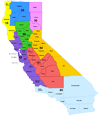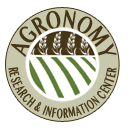Delivering scientific, research-based information, resources, education, and on-line tools on California agronomic crops to growers, researchers, industry professionals, governmental agencies, and the general public.
Nitrogen Resources
What is Agronomy?

Agronomy is the application of science and technology from the fields of biology, chemistry, economics, ecology, soil science, water science, pest management and genetics to the improvement and management of the major food crops of the world.
Agronomic Crops in California

Agronomic crops occupy over 5 million of the approximately 8 million irrigated acres in California, having large impacts on water use, nutrient management, farm profitability and human health.
History of Agronomy

In 1904, a Division of Experimental Agronomy was established in the College of Agriculture of the University of California, Berkeley. By 1906, it was clear that a Berkeley location for experimental work could not meet requirements and the division was shifted to the University Farm at Davis.


